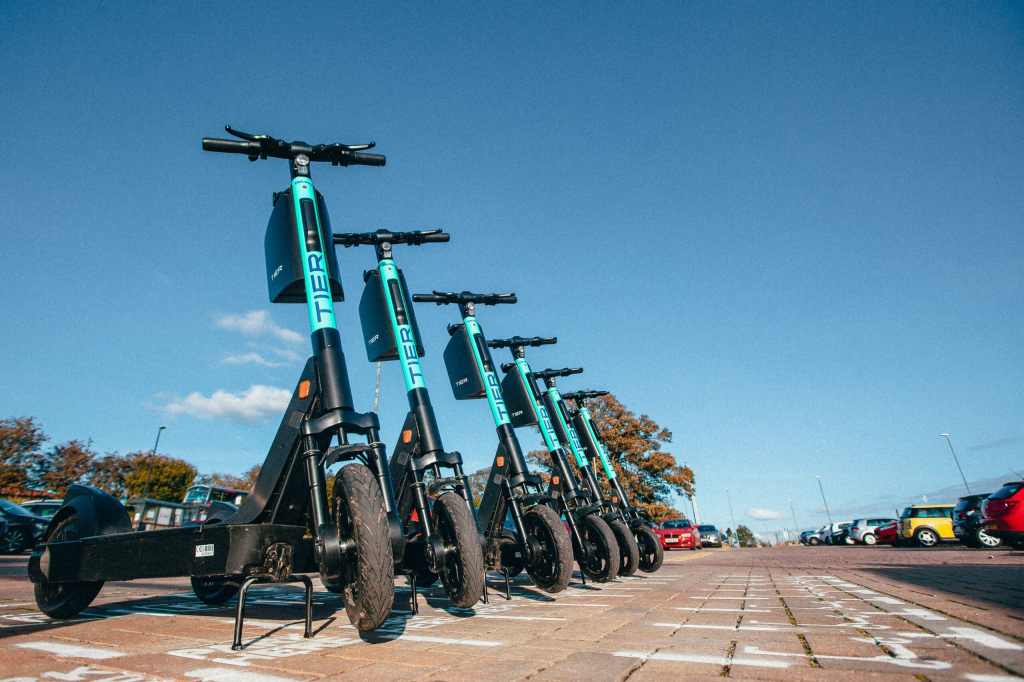Tier Mobility, the Berlin-based micromobility operator that has been steadily taking over Europe, is making a sweeping entry into North America by acquiring Spin from automaker Ford. Tier will acquire all of Spin’s 50,000 e-scooters and e-bikes, bringing the German company’s total fleet to 300,000.
The companies would not disclose the terms of the deal, but last October, Tier raised $200 million, much of which the startup said would be used for strategic investments and acquisitions. Ford, which purchased Spin for $100 million back in 2018, will maintain a strategic investment in Spin, according to Spin CEO Ben Bear.
The news comes a few months after Tier purchased e-scooter company Wind Mobility’s Italian subsidiary, marking Tier’s entry into the Italian market, as well as its purchase of bike-share startup Nextbike, signaling Tier’s move into the multi-modal space. The Spin buy will give Tier a global footprint of more than 520 cities and communities in 21 countries, making it the largest shared operator in the world. Competitors Bird and Lime claim a footprint of 350 and 200 cities globally, respectively, although they use different metrics on their scorecards.
Micromobility companies like Tier need to scale in order to reach profitability, but they’re trying to scale at a time when cities are clamping down on the number of operators allowed on the streets. Buying up rivals in cities that have won permits is a tried and tested way to circumvent the system.
Just a few weeks ago, Spin laid off a quarter of its staff as it prepared to wind down operations in some U.S. markets, Germany, Portugal and Spain. At the time, Bear said the move would help accelerate the company’s path to profitability via its strategy of pursuing exclusive or limited vendor markets. Spin has retained 100% of those permits over the last five quarters, the company says, which would make it doubly attractive as a partner for Tier across the Atlantic.
Tier will maintain the Spin brand and organizational structure in North America, where Tier doesn’t currently have a presence, but Spin’s operations in the United Kingdom will be folded into the overall Tier brand to create a “global superpower together,” Bear told TechCrunch.
“With this deal, we’re going to be able to modernize our fleet and bring over 100% swappable batteries, which will just take our operational efficiency to the next level,” said Bear, who noted only 50% of Spin’s e-scooters had swappable batteries at the moment, but those that are swappable can be swapped into Spin’s e-bikes, as well.
“This is really a unique opportunity to create a number one global player in shared micromobility in the time of consolidation and what we’re really excited about with Tier is just the consistent values alignment that they’ve shown,” said Bear.
Both Tier and Spin believe in operating with employees rather than gig workers, they’re both interested in pursuing close partnerships with cities and they have both explored new ways to charge vehicles in their respective markets. Spin, for example, has set up Spin Hubs, or electric two-wheeler parking and charging infrastructure, which are designed to increase foot traffic in certain areas while keeping scooters parked neatly.
Similarly, Tier’s Energy Network involves placing battery charging stations in retail stores across its coverage area where riders can swap a scooter’s battery at the end of their ride to earn free credit, all the while bringing foot traffic to shops and cafes.
Tier is considering bringing its Energy Network to cities across the U.S. based on the good reception it has gotten in Europe.
“We think that it’s something that could be especially interesting for universities,” Lawrence Leuschner, CEO and co-founder of Tier, told TechCrunch. “Spin has been very successful not only in cities, but also universities, where there are a lot of students who would be super interested to swap a battery and have a free ride.”
Spin has also worked with computer vision company Drover AI to pilot camera-based safety systems that can detect and correct dangerous rider behavior, like riding or parking on sidewalks. Tier has started working with startup Fantasmo to implement its Camera Positioning System, which asks users to take a photo of a building nearby when they want to end a ride, allowing Fantasmo’s 3D maps to confirm that the rider is in a city-approved parking space.
As a joined force, one of Tier’s top priorities, aside from updating Spin’s North American e-scooter fleet, is to expand the company’s e-bike footprint in North America, which Leuschner says is a huge opportunity.
“It’s going to be very important to create a bike that is really made for sharing,” said Leuschner. “It’s just the question of time until we are approaching the 50-50% mark of scooter and bikes. In Europe we see more and more e-bike tenders. We applied for three bike tenders recently, and we won all of them. We are also seeing in Europe scooter and bike tenders together.”
E-mopeds, which Tier operates in some parts of Europe, will not be a priority for the North American market, says Leuschner.
Tier’s last funding raise of $200 million was only the first tranche of a larger Series D, so there may be more consolidation in the company’s future. At the time of the raise, Tier reported its value at $2 billion. Leuschner would not share an updated valuation, but he did say the company is not looking to go public any time soon, partly because the company isn’t ready, partly because the markets are too volatile at the moment.
Correction: An earlier version of this article said Tier would have a fleet of 500,000 vehicle. Tier’s fleet will increase to 300,000 vehicles.































Comment